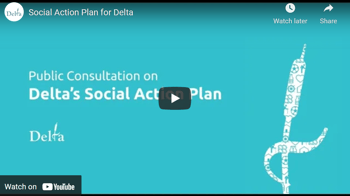As communities work together to tackle complex social issues, understanding the role and responsibilities of each sector is a first step in co-creating positive, effective change.
This short video produced by the City of Delta, British Columbia, is part of a widespread engagement strategy to update the City’s Social Action Plan. In it, the City of Delta unpacks the social role of local government in a way that is simple and easy to understand.
A Social Action Plan
The overarching goal of Delta’s Social Action Plan (backgrounder here) is one that all citizens, community-based organizations and businesses can support: to improve the quality of life for all residents through a process of community outreach, collaboration, and building to help achieve a more equitable and healthier Delta.
Strategic priorities are cross-cutting and include the following:
- Leading the change
- Healthy Delta
- Thriving children and youth
- Safe and resilient Delta
- Active and engaged seniors
- Housing and caring for Delta
- Inclusive and accessible Delta
These are big picture items. Delta recognizes that community social well-being is a shared responsibility between the City of Delta, senior levels of government and community partners.
The strength of local governments
Often, particularly for smaller rural and remote areas, local governments may feel they have little capacity to act or fear ‘downloading’ from other levels of government or ‘uploading’ of responsibility from the social sector. But Delta shows that local governments are best placed to lead certain aspects of the work.
Key takeaways
- Social planning helps cities understand community needs and gaps in services
- Cities impact residents’ quality of life through a variety of roles:
- Funding – providing grants or grants-in-aid to support local community non-profit organizations to support local agencies in meeting community needs
- Policy development – for example, housing, child care, social procurement
- Overseeing community facilities and related programs and services
- Local governments have the capacity to act in the following ways:
- Advocate to senior levels of government
- Convene community partners and provide backbone support to collaborative tables
- Conduct research, collect data and analyze trends and impacts
- Raise awareness of community-wide issues
- Lead as an exemplary employer
Understanding the municipal role
As social issues become more complex, understanding the municipal role is important for a variety of actors:
- Higher levels of government
- Local governments themselves
- Community-based organizations and citizens
Why? To better align the work in order to make the work easier and more effective.
Upcoming series on local governments
Over the next few months, we will be exploring this topic in a variety of ways. Do you have ideas or would like to contribute? Contact Jill at jill@tamarackcommunity.ca.
Resources:
- Video | Let’s Talk Delta
- Webinar| Regional Social Planning with Meriko Kubota (CEP member, Powell River), produced by PlanH: recording & slides
- Publication: The End of Poverty: Eight pathways that are ending poverty in Canada






